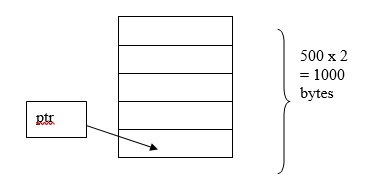C语言中的Calloc是什么?
C 库内存分配函数 void *calloc(size_t nitems, size_t size) 分配所请求的内存并返回指向它的指针。
malloc 和 calloc 的区别在于 malloc 不设置内存为零,而 calloc 将分配的内存设置为零。
内存分配函数
内存可以通过两种方式分配,如下所述 -
编译时分配内存后,执行期间不能更改。就会出现内存不足或者浪费的问题。
解决方案是动态创建内存,即在程序执行过程中根据用户的要求创建内存。
标准用于动态内存管理的库函数如下: -
- malloc ( )
- calloc ( )
- realloc ( )
- free ( )
Calloc ( ) 函数
该函数用于在运行时分配连续的内存块。
这是专门为数组设计的。
它返回一个void指针,它指向分配的内存的基地址。
calloc()函数的语法如下 -
void *calloc ( numbers of elements, size in bytes)
示例
以下示例显示 calloc() 函数的用法。
int *ptr; ptr = (int * ) calloc (500,2);
这里,将连续分配 500 个大小为 2 字节的内存块。分配的总内存 = 1000 字节。
 < /p>
< /p>
int *ptr; ptr = (int * ) calloc (n, sizeof (int));
示例程序
下面给出了一个使用动态内存分配函数Calloc计算一组元素中偶数和奇数之和的C程序。
在线演示
#include<stdio.h>
#include<stdlib.h>
void main(){
//Declaring variables, pointers//
int i,n;
int *p;
int even=0,odd=0;
//Declaring base address p using Calloc//
p = (int * ) calloc (n, sizeof (int));
//Reading number of elements//
printf("Enter the number of elements : ");
scanf("%d",&n);
/*Printing O/p -
We have to use if statement because we have to check if memory
has been successfully allocated/reserved or not*/
if (p==NULL){
printf("Memory not available");
exit(0);
}
//Storing elements into location using for loop//
printf("The elements are : </p><p>");
for(i=0;i<n;i++){
scanf("%d",p+i);
}
for(i=0;i<n;i++){
if(*(p+i)%2==0){
even=even+*(p+i);
} else {
odd=odd+*(p+i);
}
}
printf("The sum of even numbers is : %d</p><p>",even);
printf("The sum of odd numbers is : %d</p><p>",odd);
}输出
当执行上述程序时,会产生以下结果 -
Enter the number of elements : 4 The elements are : 12 56 23 10 The sum of even numbers is : 78 The sum of odd numbers is : 23
以上是C语言中的Calloc是什么?的详细内容。更多信息请关注PHP中文网其他相关文章!

热AI工具

Undresser.AI Undress
人工智能驱动的应用程序,用于创建逼真的裸体照片

AI Clothes Remover
用于从照片中去除衣服的在线人工智能工具。

Undress AI Tool
免费脱衣服图片

Clothoff.io
AI脱衣机

Video Face Swap
使用我们完全免费的人工智能换脸工具轻松在任何视频中换脸!

热门文章

热工具

记事本++7.3.1
好用且免费的代码编辑器

SublimeText3汉化版
中文版,非常好用

禅工作室 13.0.1
功能强大的PHP集成开发环境

Dreamweaver CS6
视觉化网页开发工具

SublimeText3 Mac版
神级代码编辑软件(SublimeText3)
 C语言数据结构:树和图的数据表示与操作
Apr 04, 2025 am 11:18 AM
C语言数据结构:树和图的数据表示与操作
Apr 04, 2025 am 11:18 AM
C语言数据结构:树和图的数据表示与操作树是一个层次结构的数据结构由节点组成,每个节点包含一个数据元素和指向其子节点的指针二叉树是一种特殊类型的树,其中每个节点最多有两个子节点数据表示structTreeNode{intdata;structTreeNode*left;structTreeNode*right;};操作创建树遍历树(先序、中序、后序)搜索树插入节点删除节点图是一个集合的数据结构,其中的元素是顶点,它们通过边连接在一起边可以是带权或无权的数据表示邻
 C语言文件操作难题的幕后真相
Apr 04, 2025 am 11:24 AM
C语言文件操作难题的幕后真相
Apr 04, 2025 am 11:24 AM
文件操作难题的真相:文件打开失败:权限不足、路径错误、文件被占用。数据写入失败:缓冲区已满、文件不可写、磁盘空间不足。其他常见问题:文件遍历缓慢、文本文件编码不正确、二进制文件读取错误。
 CS-第 3 周
Apr 04, 2025 am 06:06 AM
CS-第 3 周
Apr 04, 2025 am 06:06 AM
算法是解决问题的指令集,其执行速度和内存占用各不相同。编程中,许多算法都基于数据搜索和排序。本文将介绍几种数据检索和排序算法。线性搜索假设有一个数组[20,500,10,5,100,1,50],需要查找数字50。线性搜索算法会逐个检查数组中的每个元素,直到找到目标值或遍历完整个数组。算法流程图如下:线性搜索的伪代码如下:检查每个元素:如果找到目标值:返回true返回falseC语言实现:#include#includeintmain(void){i
 debian readdir如何与其他工具集成
Apr 13, 2025 am 09:42 AM
debian readdir如何与其他工具集成
Apr 13, 2025 am 09:42 AM
Debian系统中的readdir函数是用于读取目录内容的系统调用,常用于C语言编程。本文将介绍如何将readdir与其他工具集成,以增强其功能。方法一:C语言程序与管道结合首先,编写一个C程序调用readdir函数并输出结果:#include#include#includeintmain(intargc,char*argv[]){DIR*dir;structdirent*entry;if(argc!=2){
 C语言多线程编程:新手指南与疑难解答
Apr 04, 2025 am 10:15 AM
C语言多线程编程:新手指南与疑难解答
Apr 04, 2025 am 10:15 AM
C语言多线程编程指南:创建线程:使用pthread_create()函数,指定线程ID、属性和线程函数。线程同步:通过互斥锁、信号量和条件变量防止数据竞争。实战案例:使用多线程计算斐波那契数,将任务分配给多个线程并同步结果。疑难解答:解决程序崩溃、线程停止响应和性能瓶颈等问题。
 c语言如何输出倒数
Apr 04, 2025 am 08:54 AM
c语言如何输出倒数
Apr 04, 2025 am 08:54 AM
如何在 C 语言中输出倒数?回答:使用循环语句。步骤:1. 定义变量 n 存储要输出的倒数数字;2. 使用 while 循环持续打印 n 直到 n 小于 1;3. 在循环体内,打印出 n 的值;4. 在循环末尾,将 n 减去 1 以输出下一个更小的倒数。
 c语言函数的定义调用声明格式怎么搞
Apr 04, 2025 am 06:03 AM
c语言函数的定义调用声明格式怎么搞
Apr 04, 2025 am 06:03 AM
C语言函数包含定义、调用和声明。函数定义指定函数名、参数和返回类型,函数体实现功能;函数调用执行函数并提供参数;函数声明告知编译器函数类型。值传递用于参数传递,注意返回类型,保持一致的代码风格,并在函数中处理错误。掌握这些知识有助于编写优雅、健壮的C代码。
 C 中的整数:一点历史
Apr 04, 2025 am 06:09 AM
C 中的整数:一点历史
Apr 04, 2025 am 06:09 AM
整数是编程中最基础的数据类型,堪称编程的基石。程序员的工作就是赋予这些数字意义,无论软件多么复杂,最终都归结于整数运算,因为处理器只理解整数。为了表示负数,我们引入了二进制补码;为了表示小数,我们创造了科学计数法,于是有了浮点数。但归根结底,一切仍然离不开0和1。整数的简史在C语言中,int几乎是默认类型。尽管编译器可能会发出警告,但在许多情况下,你仍然可以写下这样的代码:main(void){return0;}从技术角度来看,这与以下代码等效:intmain(void){return0;}这种






